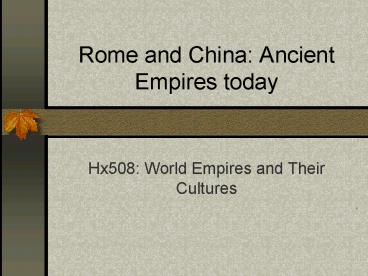Rome and China: Ancient Empires today - PowerPoint PPT Presentation
1 / 14
Title:
Rome and China: Ancient Empires today
Description:
US the new Rome? Empire' represents a singular civilization' to some a barrier to the ... land empire under one ruler - Genghis Khan'S empire stretched ... – PowerPoint PPT presentation
Number of Views:60
Avg rating:3.0/5.0
Title: Rome and China: Ancient Empires today
1
Rome and China Ancient Empires today
- Hx508 World Empires and Their Cultures
2
Todays Lecture
- Roman Empire History
- Roman Empire Significance
- Chinese Empire History
- Chinese Empire Significance
3
Rome
- Roman Republic founded 508 BCE
- Decline of the Republic 1st century BCE
- Interlude of triumvirates (Caesar) 60-27 BCE
- Emperor Augustus (Pax Romana) 27-14 AD
- Ancient Roman Empire 27 BCE-486 AD? or
- Ancient Roman Empire 27 BCE-395 AD
4
What Rome left
- A political language imperium romanum
- imperium the root of empire (used from the
19th century on) - Its association with armed might, law and
civilisation - monarchia monarchy
- respublica republic
- Political theoretical contemplation of the
meanings of words.
5
Universalism and empire in the Americas
- France, Portugal, Spain and Britain all in the
Americas - Spain initially dominated and projected itself as
the universal empire - Spain - art political theory
- Portuguese - excellence of their sciences
- The French 16th century courtly ceremony
legal codes - English models of civilized people
- English Victorian belief in their own supreme
empire
6
Roman Law
- Law should be based on justicia justice
- Legal principles and opinions codified to guide
judges - Open to modification according to prevailing
community attitudes. Interpretation important. - Law divided between jus civile (civil law) and
jus gentium (International law) - Later ideals of the universal application of the
law to all - Principles of contractual relationship developed
7
US the new Rome?
- Empire represents a singular civilization
to some a barrier to the barbarians - Empire represents universal values to its
supporters, not specific ethnic identity - To opponents represents ambition for unlimited
expansion
8
Chinas life
- A 3000-year old empire?
- A history of dynasties
- A feeling of Antiquity and continuity, despite
the ruptures of power in the past - China a recent empire with a sense of longevity
- Rome an Ancient empire which clearly finished,
but which has left a legacy
9
Mongul rule (1215-1368)
- Largest land empire under one ruler - Genghis
KhanS empire stretched from China to central
Europe - Thirteenth and fourteenth century Mongol rule saw
fluctuating boundaries - Culturally and ethnically not accepted by the
Chinese - Nomadic empire
- Intercultural exchange across Eurasia
- Opened up trade routes across land and sea
(1240-1340) - A very unusual period in Chinas past
10
Confucianism
- Philosophy of statehood
- Qing neo-Confucian rationalism
- Mandarin elite were its guardians and the
administrative corps of the state - A cultured elite that promoted educational
culture - The Mandarins ensured continuity
- The Mandate of Heaven the ruler had to govern
with virtue and not according to whim - Disasters were a sign that the end of the dynasty
was near - Romans vox populi, vox Dei Heaven sees with
the eyes of the people
11
Qing China and the West
- China never colonized
- Opium Wars 1839-1842
- Unequal treaties economic, legal and diplomatic
rights for foreigners - A growing merchant class
- Reform movements
- Republicanism
- Empire fell in 1912
12
China after 1949 end of empire?
- Old ways despised as feudal, yet
- Country reunified after decades of civil war
old imperial boundaries re-established - Dominance of the ethnic Han Chinese
- Invasion of Tibet
- Early imperial traditions used in internal
political conflicts of Maoist regime - Vision of global pre-eminence
- Architecture and icons are reminiscent of the
empire - Practices of authoritarian rule
(persecution,denouncements, execution) - Empire represents a singular civilization
to some a barrier to the barbarians - Empire represents universal values to its
supporters, not specific ethnic identity - To opponents represents ambition for unlimited
expansion
13
China compared with Rome
- Both had tremendous reach far from their
homelands - Deep impact on the societies it governed
14
Principal works used
- Anthony Pagden Lords of All the World Ideologies
of Empire in Spain, Britain and France c. 1500-c.
1800 - Anthony Pagden Spanish Imperialism and the
Political Imagination - Johann Arnason The Future that Failed
- Fernand Braudel, A History of Civilizations































